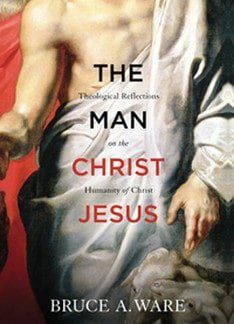The man Christ Jesus: theological reflections on the humanity of Christ
Bruce A. Ware
Crossway, 160 pages, £10.50
ISBN: 1433513056
Star Rating : 1
As a boy, Bruce Ware thought it unreasonable that in 1 Peter 2:21-23 we sinners are taught to follow the steps of one who was God and ‘who did no sin’.
In later years he asked, ‘Could it be that, even though Jesus was fully God, he lived his life fundamentally as a man?’ Christ as the ‘Spirit-empowered man’ makes following in his steps easier, he suggests.
How, though, does he deal with the injunctions to imitate God, and to be perfect as God is perfect (1 Peter 1:15-16) — where there is no recourse to the humanity of Christ?
Ware also believes that evangelicals generally understand Christ’s deity better than his humanity and he wants to redress the balance. In this book, he is not presenting a ‘complete’ Christology, he tells us, but longs for Jesus to be ‘honoured through reflections upon his humanity’. So, for example, the assertion that Jesus ‘lived his life fundamentally as a man’ appears repeatedly.
There is much that is helpful in this and it is winsomely written. Ware’s chapters cover the incarnation, Christ’s ‘empowerment by the Spirit’, his growth in wisdom (Luke 2:40,52) and faith (Hebrews 5:7-9), his temptations, death, resurrection, reign and return; and he seeks to expound the importance of Christ’s humanity in each case.
There is also a helpful chapter on why Christ had to be a man rather than a woman. Each chapter ends with applications and questions for discussion.
There are, however, problems. Although Ware makes enough statements to show that he is an orthodox Chalcedonian in his Christology, his mode of expressing himself is often puzzling, not to say misleading.
This is no doubt because of the agenda he has set himself — to establish that Christ lived fundamentally as a man (thus making it more feasible for us to claim the resources he relied upon in his humanity and obey his commandments). The main weakness is his repeated tendency to divide the natures and obscure the unity of the person in his attempt to do justice, as he sees it, to Christ’s humanity.
There are three examples of this. First, in dealing with Jesus’ miracles, Ware says in a footnote: ‘Certainly, some of Jesus’ miracles may have been done out of the divine nature. Indeed it seems in John’s Gospel, in particular, this may well be the case. But here [Matthew 12:28] Christ states specifically that the miracle performed was done in the power of the Spirit…’ (p.37).
Yet who performs the miracle? Jesus says, ‘If it is by the Spirit of God that I cast out demons…’ It is the divine person, not the human nature, who performs the miracles. Moreover, if, as Ware rightly says, these miracles are ‘confirmatory’ (p.43), they must ‘confirm’, and indeed reveal, something of his deity (see Mark 4:41; John 2:11). So, is it not confusing to try to examine them solely in relation to the humanity of Jesus? What would they reveal if they are simply the works of a man empowered by the Spirit?
Second, the repeated emphasis on the ‘Spirit-empowered man’ obscures the fact that it is the God-man who acts in all of Christ’s life, not one nature or the other.
Ware’s application and discussion focus on the resources Christ used being available for me. But even if I consider only his humanity, does it help sinful me to know a sinless Saviour resisted temptation? Did he not have the Spirit ‘without measure’ (John 3:34)? Is his empowerment really the same as mine?
Third, in his discussion of Christ’s death, Ware says, ‘We can rightly say (a) the human nature of Jesus bore our sin and died on the cross, or (b) Jesus the God-man bore our sin and died on the cross. But we would err, were we to say (c) the divine nature of Jesus bore our sin and died on the cross’ (p.125).
Option (b) is certainly correct, but can (a) be right? Can a nature bear the load of guilt as a penal substitute? Can sin be imputed to a nature? Why divide the natures? It is surely wisdom to say that whatever Christ did in his earthly life, whether raising Lazarus, eating bread at the last supper or dying on the cross, he did as God-man.
To quote another author: ‘The more we study the Gospels, the less inclined we are to say that our Lord did any particular action by virtue of his being God, or another by virtue of his being man. We do not see him sometimes as God and at other times as man.
‘What strikes us is the unity of his person. Before long, we can only think of him for what he is — the God-Man, who acted in all things as a single person’ (Olyott, Jesus is both man and God, p.130).
Bruce Ware has written a book that is in many ways helpful. He does not avoid, however, the pitfalls, in such an enterprise, of dividing the natures. This is not because he is not orthodox in his views — he makes enough statements to make that clear. But his agenda and his mode of expression (not helped by the fact that he does not make even a passing reference to Chalcedon, which Warfield called ‘a very perfect synthesis of the biblical data’) open the door to error, even if he doesn’t himself step through it.
One review I have read charges the book with having a ‘Nestorian flavour’: separating the natures; suggesting two persons in Christ. I can understand why, even though Ware is not a Nestorian. He disclaims the attempt to write a complete Christology. What he has given us, however, is imbalanced.
Mostyn Roberts
Welwyn
Reviewer’s note: ‘I am grateful to Martin Wells of Welcome Hall Evangelical Church, Bromsgrove, for sight of his critique of Ware’s book, but responsibility for what is written here is entirely mine. My blog, harpfromthewillows.blogspot.com, has a fuller version of this review.’









